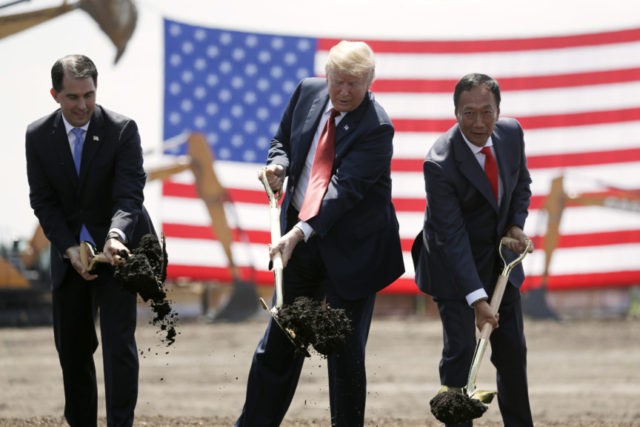Foxconn Technology had big plans to build television displays in Wisconsin.
Then the price of televisions in the United States crashed.
Foxconn said Wednesday that it is rethinking its ambitious plans to build LCD displays in a factory in Wisconsin. In an interview with Reuters, a Foxconn executive said the company would instead use the site for research purposes rather than manufacturing.
The compaany said it remains committed to the project, the creation of 13,000 jobs and “to our long-term investment in Wisconsin.” But because the global market environment that existed when the project was first announced in 2017 has shifted, “this has necessitated the adjustment of plans for all projects, including Wisconsin.”
Foxconn did not provide details about what global market changes had impacted its plans.
Media reports have cited tight labor markets and higher wages in the U.S. Manufacturing labor costs, however, are up just over 2 percent for the year.
Louis Woo, special assistant to Foxconn CEO Terry Gou, told Reuters in a story published Wednesday that it is scaling back and possibly shelving plans to build liquid crystal display panel screens.
“In terms of TV, we have no place in the U.S.,” Woo told Reuters. “We can’t compete.”
The biggest challenge to its original plan to invest $10 billion to build a 22-million square foot liquid-crystal display panel plant is not labor costs in the U.S. What has changed is that the prices of televisions have undergone a stunning decline.
Compared with a year ago, television prices have declined 18.6 percent, according to the U.S Bureau of Labor Statistics.
That makes it much harder to turn a profit while paying workers in the U.S.
There’s no ready explanation for the decline in television prices. Industry experts say a slowdown in housing may be playing a role, although the price drop has been so steep that the housing market’s woes seem insufficient. Some, speaking on the condition of anonymity, have said it is possible foreign manufacturers are illegally dumping televisions on the U.S. market at cut-rate prices.
Foxconn is based in Taiwan but does the bulk of its manufacturing, including making Apple’s iPhones, in China. It is the world’s largest electronics contract manufacturer and the largest private employer in China.
The much-ballyhooed facility was heralded by President Donald Trump and former Wisconsin Gov. Scott Walker as a once-in-a-generation opportunity to return manufacturing to the Midwest and the United States. Wisconsin Governor Tony Evers has criticized the tax incentives offered to Foxconn as too generous.
“America is open for business more than it has ever been open for business. Made in the USA: It’s all happening and it’s happening very, very quickly,” Trump said in June after visiting the Foxconn site. “Today we’re seeing the results of the pro-America agenda. America First, Make America Great Again. Greatest phrase ever used in politics, I suspect.”
“Every step of the way Foxconn has overpromised and under-delivered,” said Democratic Wisconsin Assembly Minority Leader Gordon Hintz in a statement. “This news is devastating for the taxpayers of Wisconsin. We were promised manufacturing jobs. We were promised state of the art LCD production. We were promised a game-changing economic opportunity for our state. And now, it appears Foxconn is living up to their failed track record in the U.S. — leaving another state and community high and dry.”
The president of Wisconsin’s Technology Council, Tom Still, said he’s not surprised that Foxconn wants to change course since televisions are becoming less expensive and iPhone sales are declining.
Still, a supporter of the project, noted the company has already invested as much as $200 million in Wisconsin so he’s not worried that the company might pull out.
“I do think that it’s likely that they’ll adjust to what the market conditions are,” said Still, whose group nurtures tech in Wisconsin and advises state leaders on policy.
–The Associated Press contributed to this report.

COMMENTS
Please let us know if you're having issues with commenting.